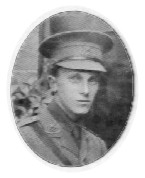  |
 HENRY GLAZE HALL (1909-1912 : 22),
Lieutenant in the Royal Air Force, was the elder son of Mr H B Hall of Newbridge
Crescent, Wolverhampton. Though at
school a boy of quiet disposition, he was intensely ardent in his work as a
member of the O.T.C. Being full of
the military spirit, he took the first opportunity of joining the Queen’s Own
Staffordshire Yeomanry, and when the war came and with it the order for
mobilisation, he was, in his father’s words, the happiest boy in England.
From 1912 to 1914 he was learning and working as an engineer at the works
of Orme, Evans & Co., of which firm his father is a director.
During this time he attended Army Manoeuvres and the Camp at Patsull
Park, and when the fateful day of 1914 came he was sent with his Yeomanry to
Diss in Norfolk. Then followed a
commission as Second Lieutenant in the 11th Battalion of the South
Staffords, with training at several camps, including Cannock Chase, and
thereafter he was sent to Mudros. The
abandonment of the Gallipoli enterprise, for which he was destined, led to his
arrival in Egypt, where he served with several regiments, particularly the
Sherwood Foresters. Subsequently he
was transferred to the 14th Battalion of the King’s (Liverpool)
Regiment and sent to Salonica, to experience the trying conditions of a summer
and winter with our army there. Finally,
in June 1917, he passed into the Royal Flying Corps (now the Royal Air Force),
went back to Egypt for training, and gained his wings two months later.
Thence he went with our forces into Palestine and reached Jerusalem, but
was again ordered to Macedonia, where he met his death on July 17th
1918. He was on a bombing
expedition from Ambarkoy to Hudova as observer on an Armstrong-Whitworth
machine. At a height of 8,000 feet
anti-aircraft guns brought the aeroplane down in flames, and both he and the
pilot were killed instantly. Hall
had received his commission as Lieutenant in May 1918. HENRY GLAZE HALL (1909-1912 : 22),
Lieutenant in the Royal Air Force, was the elder son of Mr H B Hall of Newbridge
Crescent, Wolverhampton. Though at
school a boy of quiet disposition, he was intensely ardent in his work as a
member of the O.T.C. Being full of
the military spirit, he took the first opportunity of joining the Queen’s Own
Staffordshire Yeomanry, and when the war came and with it the order for
mobilisation, he was, in his father’s words, the happiest boy in England.
From 1912 to 1914 he was learning and working as an engineer at the works
of Orme, Evans & Co., of which firm his father is a director.
During this time he attended Army Manoeuvres and the Camp at Patsull
Park, and when the fateful day of 1914 came he was sent with his Yeomanry to
Diss in Norfolk. Then followed a
commission as Second Lieutenant in the 11th Battalion of the South
Staffords, with training at several camps, including Cannock Chase, and
thereafter he was sent to Mudros. The
abandonment of the Gallipoli enterprise, for which he was destined, led to his
arrival in Egypt, where he served with several regiments, particularly the
Sherwood Foresters. Subsequently he
was transferred to the 14th Battalion of the King’s (Liverpool)
Regiment and sent to Salonica, to experience the trying conditions of a summer
and winter with our army there. Finally,
in June 1917, he passed into the Royal Flying Corps (now the Royal Air Force),
went back to Egypt for training, and gained his wings two months later.
Thence he went with our forces into Palestine and reached Jerusalem, but
was again ordered to Macedonia, where he met his death on July 17th
1918. He was on a bombing
expedition from Ambarkoy to Hudova as observer on an Armstrong-Whitworth
machine. At a height of 8,000 feet
anti-aircraft guns brought the aeroplane down in flames, and both he and the
pilot were killed instantly. Hall
had received his commission as Lieutenant in May 1918.
|
|
 
|
|